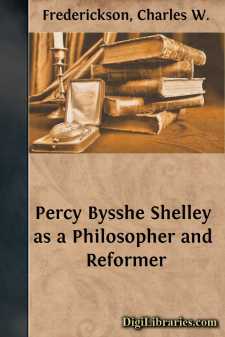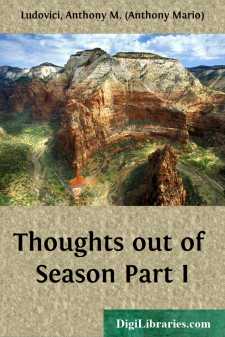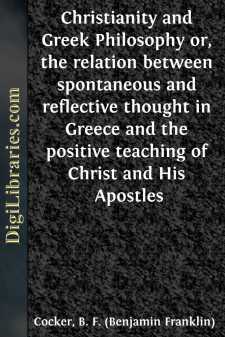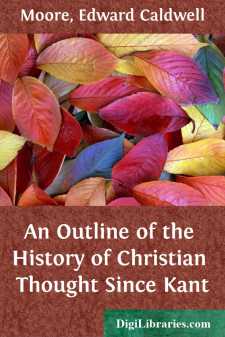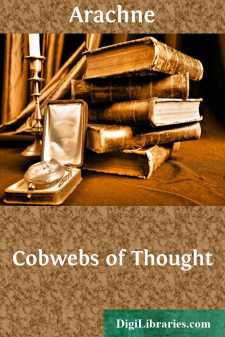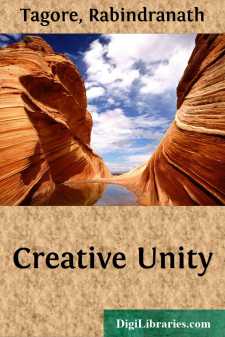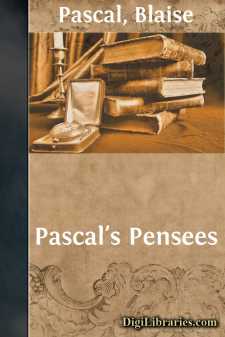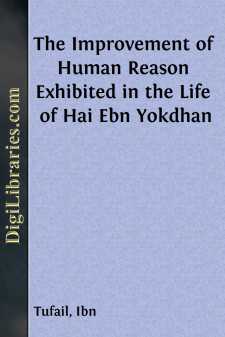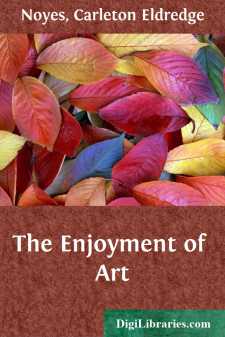Philosophy
- Aesthetics 11
- Eastern 1
- Ethics & Moral Philosophy 3
- General 30
- Hindu 2
- History & Surveys 3
- Logic 1
- Metaphysics 3
- Political 1
- Religious 8
- Social 3
- Taoist 1
Philosophy Books
Sort by:
PERCY BYSSHE SHELLEY, AS A PHILOSOPHER AND REFORMER. A PAPER READ BEFORE THE NEW YORK LIBERAL CLUB, ON FRIDAY, AUGUST 6TH, 1875. "Let us see the Truth, whatever that may be."—SHELLEY, 1822. Mr. Vice-President and Members of the Liberal Club: "The Blood of the Martyr is the Seed of the Church." Persecution ever fails in accomplishing its desired ends, and as a rule lays the...
more...
THE Editor begs to call attention to some of the difficulties he had to encounter in preparing this edition of the complete works of Friedrich Nietzsche. Not being English himself, he had to rely upon the help of collaborators, who were somewhat slow in coming forward. They were also few in number; for, in addition to an exact knowledge of the German language, there was also required sympathy and a...
more...
PREFACE. In preparing the present volume, the writer has been actuated by a conscientious desire to deepen and vivify our faith in the Christian system of truth, by showing that it does not rest solely on a special class of facts, but upon all the facts of nature and humanity; that its authority does not repose alone on the peculiar and supernatural events which transpired in Palestine, but also on the...
more...
CHAPTER I A. INTRODUCTION The Protestant Reformation marked an era both in life and thought for the modern world. It ushered in a revolution in Europe. It established distinctions and initiated tendencies which are still significant. These distinctions have been significant not for Europe alone. They have had influence also upon those continents which since the Reformation have come under the dominion...
more...
by:
Arachne
I. OUR IGNORANCE OF OURSELVES. Self-Analysis, apart from its scientific uses, has seldom rewarded those who have practised it. To probe into the inner world of motive and desire has proved of small benefit to any one, whether hermit, monk or nun, indeed it has been altogether mischievous in result, unless the mind that probed, was especially healthy. Bitter has been the dissatisfaction, both with the...
more...
Civility is beauty of behaviour. It requires for its perfection patience, self-control, and an environment of leisure. For genuine courtesy is a creation, like pictures, like music. It is a harmonious blending of voice, gesture and movement, words and action, in which generosity of conduct is expressed. It reveals the man himself and has no ulterior purpose. Our needs are always in a hurry. They rush...
more...
by:
Blaise Pascal
INTRODUCTION It might seem that about Blaise Pascal, and about the two works on which his fame is founded, everything that there is to say had been said. The details of his life are as fully known as we can expect to know them; his mathematical and physical discoveries have been treated many times; his religious sentiment and his theological views have been discussed again and again; and his prose...
more...
by:
Ibn Tufail
THE PREFACE. When Mr. Pococke first publish'd this Arabick Author with his accurate Latin Version, Anno 1671. Dr. Pococke his Father, that late eminent Professor of the Oriental Languages in the University of Oxford, prefix'd a Preface to it; in which he tells us, that he has good Reason to think, that this Author was contemporary with Averroes, who died very ancient in the Year of the Hegira...
more...
PREFACE The following pages are the answer to questions which a young man asked himself when, fresh from the university, he found himself adrift in the great galleries of Europe. As he stood helpless and confused in the presence of the visible expressions of the spirit of man in so many ages and so many lands, one question recurred insistently: Why are these pictures? What is the meaning of all this...
more...
by:
John Armstrong
INTRODUCTION The essays on taste taken from the work of John Gilbert Cooper and John Armstrong and reprinted in this issue are of interest and value to the student of the eighteenth century because they typify the shifting attitudes toward taste held by most mid-century poets and critics. Cooper, who accepts the Shaftesbury-Hutchesonian thesis of the internal sense, emphasizes the personal, ecstatic...
more...


